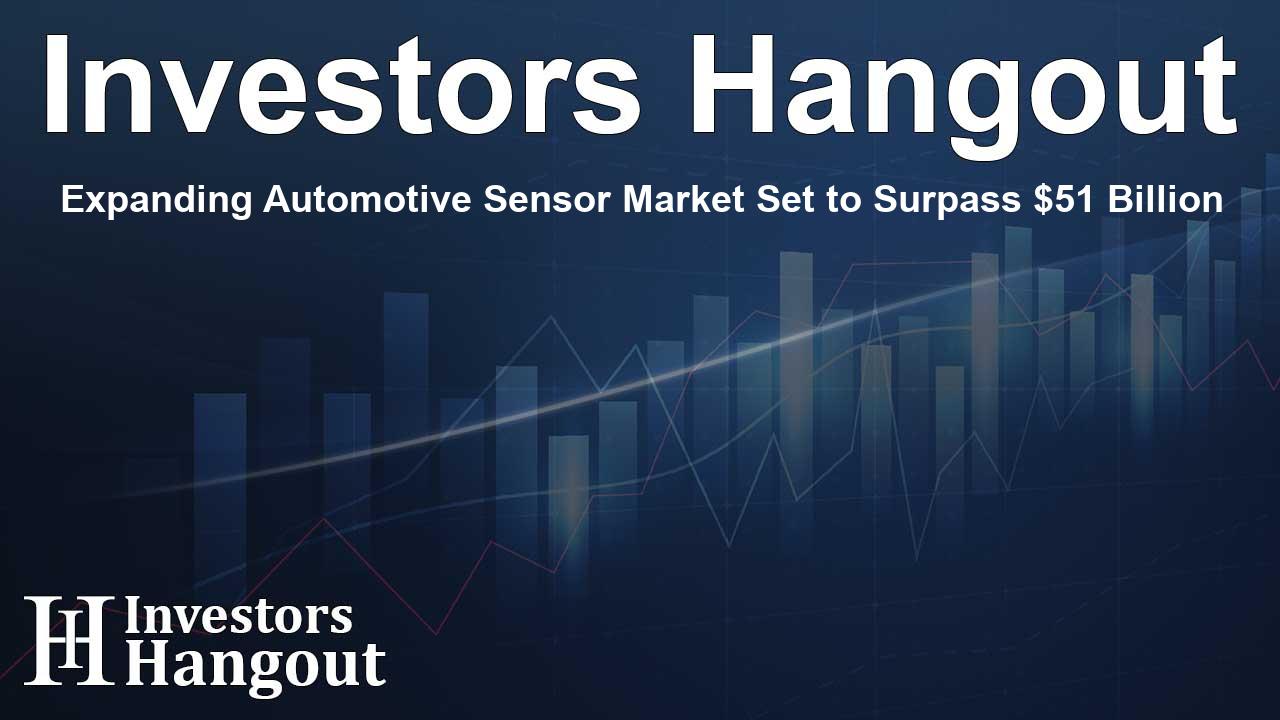Expanding Automotive Sensor Market Set to Surpass $51 Billion

Growth in the Automotive Sensor Sector
The automotive sensor market is on an exciting trajectory, poised to grow from a valuation of $37.8 billion in 2024 to an impressive $51.6 billion by 2029. This rise translates to an annual growth rate of 6.4% over this period. Recent research highlights the shifts and transformations taking place within the industry and emphasizes how innovative technologies are shaping the future.
Market Insights and Dynamics
This analysis delves into the global market for automotive sensor technologies, examining various products, applications, and market deployment trends across different vehicle types. It's worth noting that the data is presented in constant U.S. dollars, providing a clearer picture of the underlying growth without inflation adjustments.
Consumer Interest in Electric Vehicles
A significant catalyst for this market’s growth is the evolving consumer interest in electric vehicles (EVs). As individuals seek out more sustainable travel options, the demand for EVs is surging. This, in turn, necessitates advanced sensor technology for battery systems and safety measures, creating a robust market landscape.
Regulatory Impacts on Automotive Safety
Government regulations are also playing a critical role in driving advancements within the automotive sector. Enhanced safety regulations are emphasizing the importance of technology in vehicles, leading to a consistent rise in sensor demand to enhance accident prevention and overall vehicle safety.
Market Drivers and Trends
Several key trends are influencing the automotive sensor market:
Heightened Demand for Safety Features
Consumer awareness regarding vehicle safety features has reached new heights, fostering a burgeoning appetite for sophisticated sensors that ensure safer driving experiences. Innovative solutions aimed at accident avoidance and safety enhancement are becoming standard industry requirements.
The Shift Toward Smart Vehicles
As vehicles become smarter through enhanced connectivity and autonomous driving capabilities, the need for intricate sensor technology continues to escalate. The evolution towards smart vehicles is undeniably shaping robust advancements in automotive sensors.
Advancements in Communication Technologies
Within this landscape, Vehicle-to-Everything (V2X) communication technology is simultaneously evolving, allowing vehicles to engage with one another, as well as with surrounding infrastructure. This integration of advanced sensors is crucial for the continually advancing automotive technology.
5G Integration
The integration of 5G technology within automotive sensors enables unprecedented communication speeds and reliability. This advancement is facilitating improvements in sensor performance, allowing for real-time data transfer and enhanced vehicle efficiency.
Interesting Insights and Statistics
The market dynamics further reveal some compelling statistics:
- Global automobile sales surged nearly 10% in 2023, exceeding 72 million units, primarily due to resolution of supply chain difficulties.
- From 2024, Europe's stringent safety regulations mandate the installation of autonomous emergency braking (AEB) and lane-keeping systems in new vehicles.
- Electric vehicle sales reached nearly 14 million in 2023, rising from a mere 4% to 18% market share since 2020.
Emerging Players in the Market
As the automotive sensor market grows, a number of emerging startups are making waves:
- Cepton Technologies is focused on high-performance LiDAR solutions for automotive applications, promising reliability and cost-effectiveness.
- Grayscale AI specializes in sensor fusion systems, crucial for the development of autonomous driving technologies.
- Bynav Technology is recognized for its advanced navigation technology, supporting autonomous driving efforts with precision positioning solutions.
Market Leaders
Leading companies within the sector include:
- APTIV
- ALLEGRO MICROSYSTEMS INC.
- CONTINENTAL AG
- ROBERT BOSCH GMBH
As the industry navigates changing technologies, the insights garnered from detailed market analysis become invaluable. For businesses making strides in automotive sensor technology, understanding this dynamic environment is key to staying competitive.
Frequently Asked Questions
What is the projected size of the automotive sensor market?
The market is expected to grow to $51.6 billion by the end of 2029, up from $37.8 billion in 2024.
What factors are contributing to market growth?
Market growth is driven by the increasing demand for vehicle safety features, connected vehicle technologies, and the rising popularity of electric vehicles.
Which segments are covered in the automotive sensor report?
The report includes segments based on sensor types, vehicle types, propulsion technology, applications, and geographical areas.
What innovative technologies are emerging?
Innovations in vehicle connectivity, including V2X communication, and the integration of 5G technology are advancing sensor capabilities.
Who are the market leaders in the automotive sensor industry?
Key market leaders include APTIV, ROBERT BOSCH GMBH, and CONTINENTAL AG, among others.
About The Author
Contact Dominic Sanders privately here. Or send an email with ATTN: Dominic Sanders as the subject to contact@investorshangout.com.
About Investors Hangout
Investors Hangout is a leading online stock forum for financial discussion and learning, offering a wide range of free tools and resources. It draws in traders of all levels, who exchange market knowledge, investigate trading tactics, and keep an eye on industry developments in real time. Featuring financial articles, stock message boards, quotes, charts, company profiles, and live news updates. Through cooperative learning and a wealth of informational resources, it helps users from novices creating their first portfolios to experts honing their techniques. Join Investors Hangout today: https://investorshangout.com/
The content of this article is based on factual, publicly available information and does not represent legal, financial, or investment advice. Investors Hangout does not offer financial advice, and the author is not a licensed financial advisor. Consult a qualified advisor before making any financial or investment decisions based on this article. This article should not be considered advice to purchase, sell, or hold any securities or other investments. If any of the material provided here is inaccurate, please contact us for corrections.
